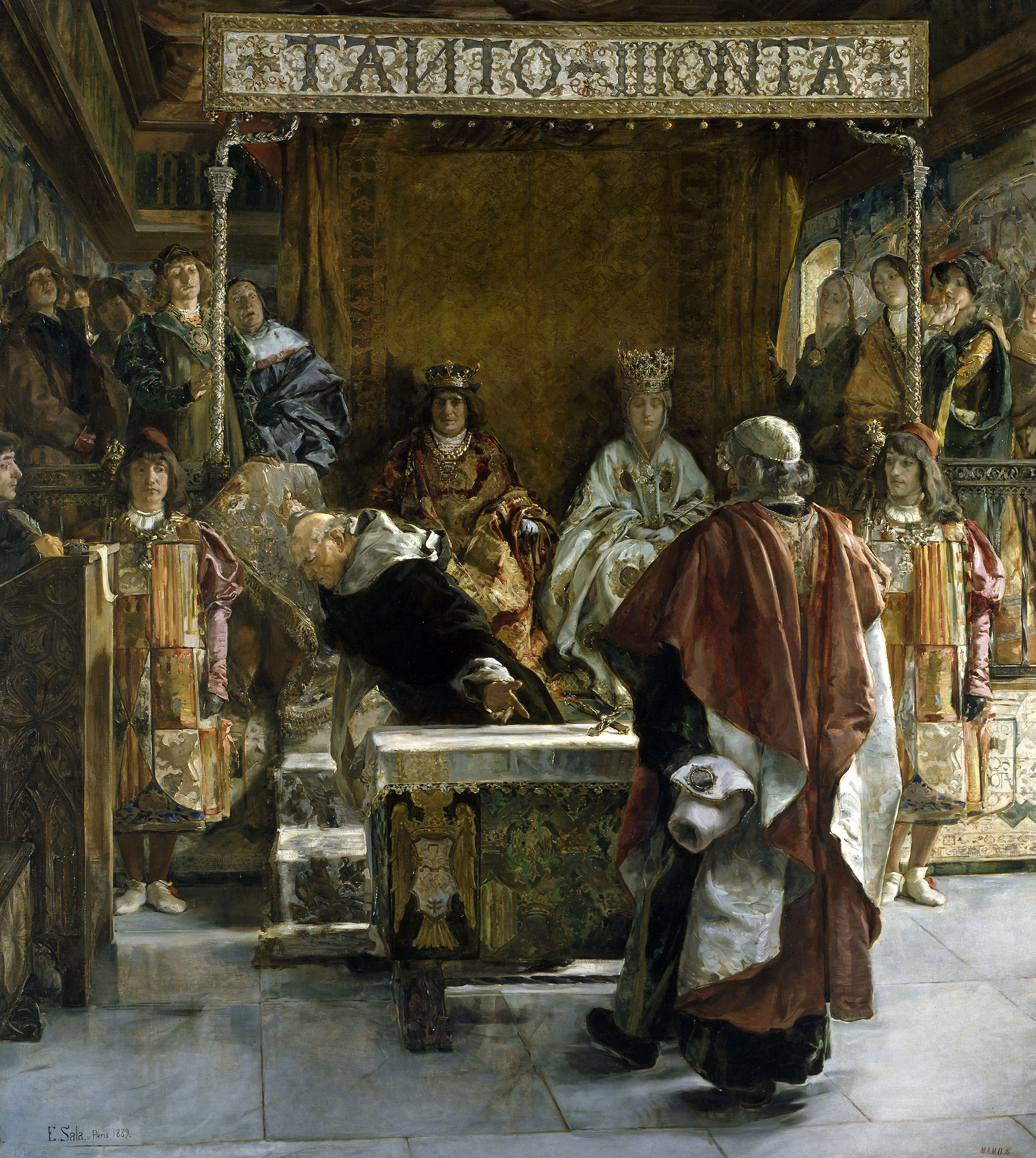Tanto Monta, Monta Tanto, Isabel Como Fernando on:
[Wikipedia]
[Google]
[Amazon]

 ''Tanto monta, monta tanto, Isabel como Fernando'' () or simply ''Tanto monta, monta tanto'' () was the alleged
''Tanto monta, monta tanto, Isabel como Fernando'' () or simply ''Tanto monta, monta tanto'' () was the alleged
El libro de los proverbios glosados: (1570-1580)
Sebastián de Horozco Hence it is associated to the yoke in the emblem of the yoke and arrows. The motto ''Tanto monta, monta tanto'' appeared on the Spanish Royal Standard of the Catholic Monarchs from 1492–1506. Romantic painters represented it on the Spanish flags that Christopher Columbus brought to the New World, but there is no proof that he actually carried them. Later the motto was changed to ''

 ''Tanto monta, monta tanto, Isabel como Fernando'' () or simply ''Tanto monta, monta tanto'' () was the alleged
''Tanto monta, monta tanto, Isabel como Fernando'' () or simply ''Tanto monta, monta tanto'' () was the alleged motto
A motto (derived from the Latin , 'mutter', by way of Italian , 'word' or 'sentence') is a sentence or phrase expressing a belief or purpose, or the general motivation or intention of an individual, family, social group, or organisation. Mot ...
of a prenuptial agreement made by the Spanish Catholic Monarchs
The Catholic Monarchs were Queen Isabella I of Castile and King Ferdinand II of Aragon, whose marriage and joint rule marked the ''de facto'' unification of Spain. They were both from the House of Trastámara and were second cousins, being bot ...
Isabella I of Castile and Ferdinand II of Aragon. During their joint reign they did in fact support each other effectively in accordance with their motto of equality. Still, the wording "Tanto monta, monta tanto, ''Isabel como Fernando''" is actually a popular saying invented many centuries later, not the real motto. Besides, and contrary to popular belief, ''Tanto monta'' was only the motto of King Ferdinand of Aragon, and never used by Isabella.Ridao, J.M. Contra la Historia, 2000 p. 112
The Catholic Monarchs' great sword kept in the Royal Armoury of Madrid
The Royal Armoury of Madrid or Real Armería de Madrid, is a collection that, among many other things, contains the personal arms of the Kings of Spain, and also houses military weapons, armours and diplomatic works of art like mixed tapestries, ...
, made in the 15th century, was used during the reign of Ferdinand II of Aragon and Isabelle of Castile and in all solemn court occasions until the 18th century. With this sword, the Catholic Monarchs Ferdinand and Isabella knighted Christopher Columbus
Christopher Columbus
* lij, Cristoffa C(or)ombo
* es, link=no, Cristóbal Colón
* pt, Cristóvão Colombo
* ca, Cristòfor (or )
* la, Christophorus Columbus. (; born between 25 August and 31 October 1451, died 20 May 1506) was a ...
on his return from his first voyage to America. In the Throne Hall of the Royal Palace in Barcelona, Columbus was named "Admiral of the Ocean" and "Viceroy of the Indies". This ceremonial sword was used as the symbol of the royal power in all religious and political ceremonies starting with the conquest of Granada and the beginning of Spain as a nation. On its hand guard it bears the inscription "''Tanto monta, monta tanto''" that translates roughly to "As much as the one is worth, so too is the other."
Gordian knot
Another version holds that the motto comes from the proverb ''Tanto monta cortar como desatar'' ("It amounts to the same, cutting as untying"), from the Classical story of the Gordian knot whereAlexander the Great
Alexander III of Macedon ( grc, Ἀλέξανδρος, Alexandros; 20/21 July 356 BC – 10/11 June 323 BC), commonly known as Alexander the Great, was a king of the ancient Greek kingdom of Macedon. He succeeded his father Philip II to ...
, wanting to untie the knot of a sacred yoke at Gordion
Gordion ( Phrygian: ; el, Γόρδιον, translit=Górdion; tr, Gordion or ; la, Gordium) was the capital city of ancient Phrygia. It was located at the site of modern Yassıhüyük, about southwest of Ankara (capital of Turkey), in the ...
to fulfill the prophecy of the conquest of Asia, decided to cut it with his sword.page 121El libro de los proverbios glosados: (1570-1580)
Sebastián de Horozco Hence it is associated to the yoke in the emblem of the yoke and arrows. The motto ''Tanto monta, monta tanto'' appeared on the Spanish Royal Standard of the Catholic Monarchs from 1492–1506. Romantic painters represented it on the Spanish flags that Christopher Columbus brought to the New World, but there is no proof that he actually carried them. Later the motto was changed to ''
Plus Ultra
''Plus ultra'' (, , en, "Further beyond") is a Latin phrase and the national motto of Spain. A reversal of the original phrase ''non plus ultra'' ("Nothing further beyond"), said to have been inscribed as a warning on the Pillars of Herc ...
'' which is Latin for "further beyond" referring to Spain and its lands in the Americas.
References
{{Commons category, Tanto Monta Mottos Spanish words and phrases Ferdinand II of Aragon Isabella I of Castile 15th-century neologisms